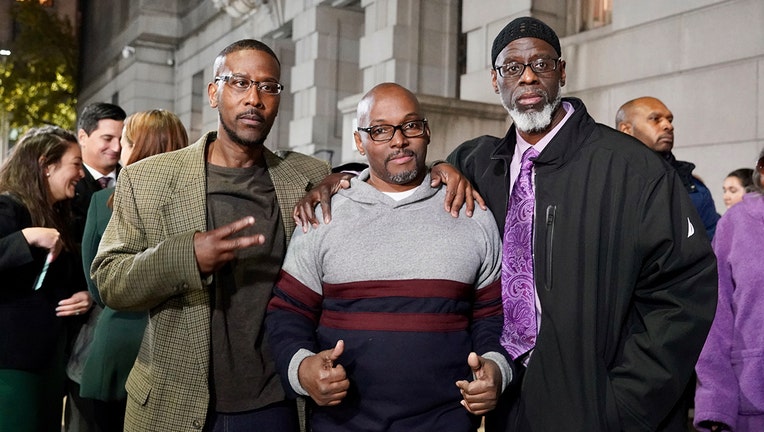Maryland men jailed for more than three decades in teen's killing are exonerated, released from prison

Pictured from left to right: Alfred Chestnut, Andrew Stewart, and Ransom Watkins after they were exonerated. (Mid-Atlantic Innocence Project.)
BALTIMORE, Md. - Three Maryland men who served 36 years in prison for a murder they didn’t commit were exonerated and released from prison Monday afternoon after a review of their case.
Alfred Chestnut, Ransom Watkins, and Andrew Stewart were arrested in November 1983 in connection with the slaying of 14-year-old DeWitt Duckett. The teenager was accosted over his Georgetown jacket and shot in the neck while walking to class at a Baltimore school.
Marilyn Mosby, the Baltimore City state’s attorney, told Baltimore's Fox 45 that detectives targeted Chestnut, Watkins, and Stewart by coercing other teenage witnesses to make their case.
She said material that could have freed the young men, all of whom are black, was kept from their defense team and the jury. They were teenagers when they were sentenced to life in prison in 1984.
Mosby’s office reopened the case earlier this year after Chestnut sent a letter to the Conviction Integrity Unit. The Washington Post reported that Chestnut had included exculpatory evidence he uncovered last year.
Prosecutors now say police reports show multiple witnesses told police that another suspect, who was 18 at the time of the crime, was the shooter. One student reportedly saw him flee the scene and dump a gun as police arrived at Harlem Park Junior High School, but authorities at the time focused their investigation on the trio.
The suspect identified by witnesses was shot to death in 2002.
An assistant prosecutor working on the case told the court in 1984 that the state did not have any reports that would have raised doubts about the defendants' guilt even though police records had statements involving the 18-year-old suspect and also showed trial witnesses had failed to identify the teenagers in photo lineups. A judge sealed those documents, but Chestnut obtained them through a public records request last year.
"Everyone involved in this case — school officials, police, prosecutors, jurors, the media, and the community — rushed to judgment and allowed their tunnel vision to obscure obvious problems with the evidence," said Shawn Armbrust, executive director of the Mid-Atlantic Innocence Project, which represents Watkins. He added that "this case should be a lesson to everyone that the search for quick answers can lead to tragic results."
The Associated Press contributed to this report.
Get updates on FOX News

